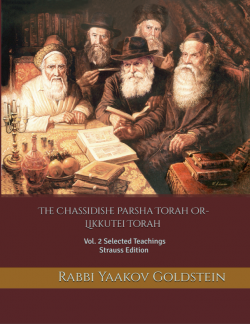*As an Amazon Associate I earn from qualifying purchases.
The ark of Noah refers to the words of prayer and symbolizes the ability of businessmen to have a more intense prayer than even the Torah learner:[1]
The ark of Noah in its spiritual correspondence refers to the words of prayer, which are also called a Teiva in Hebrew. On this the verse instructs Noah and his family to enter the ark, which is a spiritual instruction for each Jew to immerse himself in the words of prayer. The meaning of the fact that the water reached a height of 15 Amos, references to the fact that the animal soul is able to overcome the G-dly soul with its intensity and power in its involvement in worldly matters and in making a living. Nonetheless, as the verse states the ark remained above the water, teaching us that even one who is immersed in worldly matters is able to push himself to overcome the waters of Noah who seek to flood his spiritual sensitivities, and attain a love and attachment to G-d nonetheless. Furthermore, as a result of the waters of the flood, the ark itself became elevated and rode on top of the heights of the water. This symbolizes the idea that those who are involved in worldly matters of making a living are able to not only overcome their worldly involvement but furthermore to take advantage of it to even enhance their spiritual service even more than the Torah learner, as explained above that when they immerse themselves in prayer it comes with much more passion due to their involvement in matters of darkness. Accordingly, it is a grave mistake that businessmen make to think that they are incapable of reaching any heights in service of G-d and the service of prayer and that they have a disadvantage in comparison to those who are Torah learners, as in truth it is to the contrary that they have an advantage over them and are able to accomplish more in their prayer than the regular Torah learner.
| The Divine lesson: For whatever reason, it is common in recent generations to believe that anyone who does not have an occupation that’s involved with Torah learning, such as learning in a Kolel, having a Rabbinical position as a Rav or Rosh Yeshiva, is incapable of becoming a true Torah scholar and proper Oveid Hashem. How can someone who works as a doctor or lawyer or accountant or construction worker or manager of a pizza shop be considered or expected to be a Torah scholar and Oveid Hashem. In truth, however, historically many of the great scholars of the Jewish people from both Biblical to Talmudic and Rishonic times, had occupations that did not involve Rabbinics, and were nonetheless considered the most esteemed Torah scholars of their time. The lesson from the above teaching is to emphasize to our generation that even one who for whatever reason did not merit an occupation that involves spiritual matters and Torah learning, but rather a simple mundane activity, has the potential and the obligation to exceed in his Torah learning and service of G-d as much as possible, to the point that he even surpasses the service of G-d of the Torah learner. No one should cut themselves short and believe that their spiritual aspirations are finished if they’re not involved in an occupation that relates to spirituality. |
[1] Torah Or 9a


 Donate
Donate

Leave A Comment?
You must be logged in to post a comment.